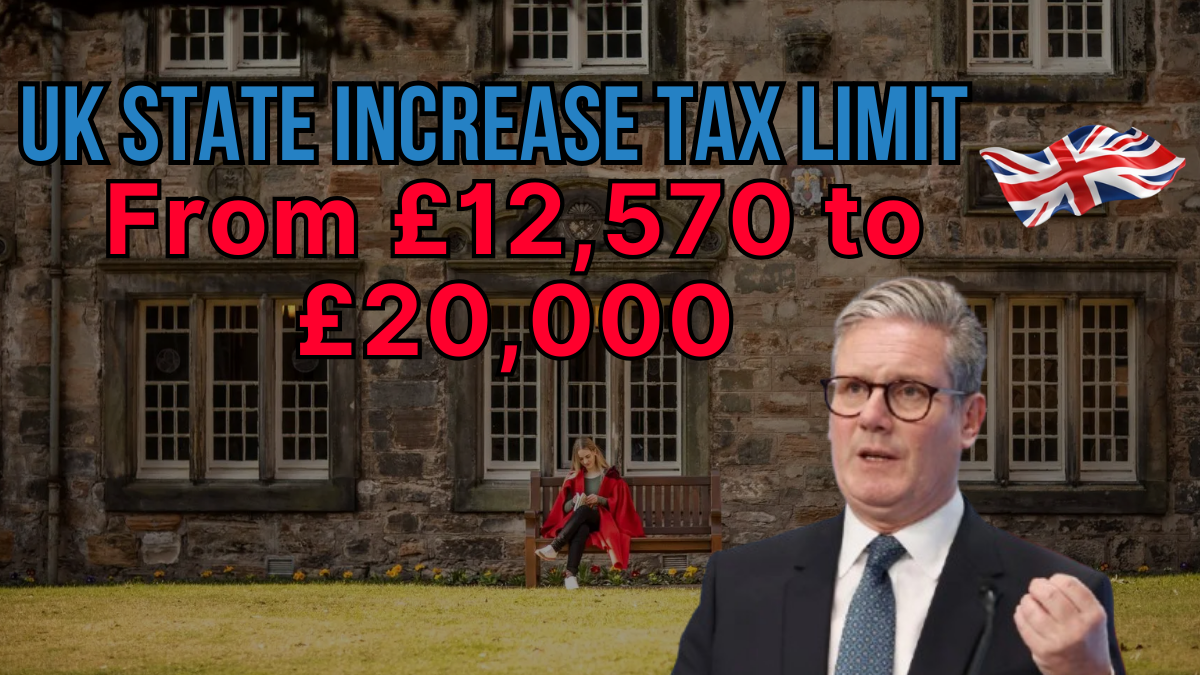A nationwide petition is calling on the UK government to raise the income tax personal allowance from £12,570 to £20,000. The campaign, led by Alan David Frost, has captured the attention of pensioners, low-income workers, and families struggling to make ends meet.

With over 281,000 signatures, the petition has already crossed the threshold for a Parliamentary debate, sparking widespread discussion on how such a change could impact the economy, public finances, and household budgets.
Quick Summary
Aspect |
Details |
|---|---|
Current Personal Allowance |
£12,570 |
Proposed Personal Allowance |
£20,000 |
Potential Annual Tax Savings |
Up to £1,486 for basic-rate taxpayers |
Main Beneficiaries |
Low-income earners, state pensioners, middle-income workers |
Petition Status |
281,000+ signatures |
Parliamentary Debate |
Triggered (requires 100,000+ signatures) |
Government Position |
No confirmed plans to increase at present |
Official Link |
What Is the Personal Allowance?
The Personal Allowance is the amount of income you can earn in a tax year before paying income tax. Currently, this stands at £12,570 and has been frozen since 2021.
While wages, pensions, and living costs have risen, the frozen allowance means more people are paying income tax on a greater portion of their earnings – a phenomenon known as fiscal drag. Critics argue that this is unfair, especially for pensioners and low-income households.
The Proposed Change: From £12,570 to £20,000
The petition seeks to raise the personal allowance by £7,430, which could significantly reduce the tax burden for millions.
Potential Benefits by Group:
- Low-Income Earners – More take-home pay and reduced reliance on state benefits.
- State Pensioners – Little or no tax on state and private pensions.
- Middle-Income Workers – Potential tax savings of up to £1,486 annually.
- Families – Increased disposable income, easing pressure from rising costs.
Potential Tax Savings Explained
If the proposed increase is implemented, a basic-rate taxpayer could save up to:
Annual Income |
Tax Paid at £12,570 Allowance |
Tax Paid at £20,000 Allowance |
Annual Saving |
|---|---|---|---|
£20,000 |
£1,486 |
£0 |
£1,486 |
£25,000 |
£2,486 |
£1,000 |
£1,486 |
£30,000 |
£3,486 |
£2,000 |
£1,486 |
This would effectively remove many pensioners from paying income tax altogether.
How the Petition Process Works
The UK Parliament’s petition system operates in stages:
- 10,000 signatures – Government must respond.
- 100,000 signatures – Parliament must consider for debate.
- 281,000+ signatures – Already achieved, triggering debate consideration.
You can read and sign the petition via the UK Government Petitions Website.
Current Government Position
Despite public support, the government has no current plans to increase the personal allowance. Treasury officials cite the potential loss of billions in tax revenue, which could impact funding for essential services such as the NHS, education, and public transport.
How the Current Tax Threshold Works
- Standard Allowance – £12,570 tax-free each year.
- High Earner Reduction – For incomes above £100,000, the allowance is reduced by £1 for every £2 over that limit, disappearing entirely at £125,140.
- Marriage Allowance – Low-earning spouses can transfer up to £1,260 of their allowance to their partner.
- Married Couple’s Allowance – For those born before April 6, 1935, offering a different tax reduction method.
Pros and Cons of Raising the Personal Allowance
Pros
- Increased Disposable Income – More money for households to spend or save.
- Reduced Benefit Dependence – Could lessen reliance on welfare.
- Support for Pensioners – Protects fixed-income households from inflation.
- Stimulated Economy – Higher consumer spending could boost growth.
Cons
- Reduced Government Revenue – Billions lost in tax income.
- Possible Tax Shifts Elsewhere – Could lead to increases in VAT or National Insurance.
- Risk of Inflation – More disposable income could push up prices.
- Impact on Public Services – Funding cuts may affect service quality.
Public Reaction
The petition has resonated strongly with pensioners and working families, with many arguing the current tax-free threshold is outdated. Others caution that the change must be balanced with a sustainable funding model for public services.
Frequently Asked Questions (FAQs)
Q1: How much could I save if the personal allowance rises to £20,000?
A: Basic-rate taxpayers could save up to £1,486 per year.
Q2: Who would benefit most from this change?
A: Low earners, pensioners, and middle-income workers would see the biggest benefit.
Q3: Has Parliament agreed to raise the allowance?
A: Not yet. The petition is under debate consideration, but no legislation has been passed.
Q4: Would this change affect higher-rate taxpayers?
A: Higher earners may benefit, but savings are capped at the basic rate threshold.
Q5: Can the allowance be increased without affecting public services?
A: It would require either spending cuts elsewhere or increased revenue from other taxes.
Conclusion
The proposal to raise the UK’s personal income tax allowance to £20,000 has gained remarkable public traction, with over 281,000 signatures and a Parliamentary debate triggered. If approved, it could significantly reduce the tax burden for millions, particularly pensioners and low earners.
However, the government faces a difficult balance between easing financial pressures on households and maintaining funding for public services. Until a decision is made, the debate over the future of the personal allowance will remain at the heart of the UK’s economic policy discussions.
For updates and to sign the petition, visit: UK Government Petitions Website
For More Information Click Here